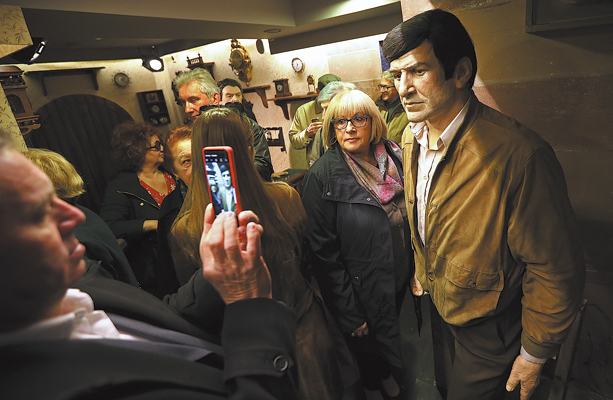Movie hero adored by China comes alive at Sarajevo museum
By Julian Shea in Sarajevo, Bosnia And Herzegovina | Updated: 2019-05-06 09:56

If you ask Chinese people what they know of Sarajevo, the chances are they would say one word: Valter.
Few cities in Europe have quite as many different faces and identities as Sarajevo, capital of Bosnia and Herzegovina.
The location of the assassination that sparked World War I, the 1984 Winter Olympic Games and the longest siege in modern European history is soaked in history, beauty and tragedy. It looks in equal parts like 15th century Istanbul, 19th century Vienna and 21st century Paris.
If you ask Chinese people what they know of Sarajevo, the chances are they would say one word: Valter.
The 1972 film Valter brani Sarajevo (Walter defends Sarajevo) is a fictionalized account based on real events when the Nazis battled to control the city, then part of a united Yugoslavia, in World War II. It is one of the most popular overseas films ever screened in China.
Now, nearly five decades after its release, a new museum in Sarajevo is breathing fresh life into the legend of Valter. China could be helping bring it back to life.

In the film, looking for the elusive resistance leader known only as Valter, the Germans realize Valter is not one man, but the spirit of the city, and standing on a terrace overlooking Sarajevo, one of them points and utters the immortal line: "Das ist Valter." (That is Walter).
Film director Jasmin Durakovic set up Sarajevo's Valter Museum, which opened on April 6, the city's liberation day. He told China Daily that right from the outset, China had played a huge part in the film's enduring success.
"It was popular across all of Yugoslavia, and sold to 80 or 90 countries, but it was China where it was the biggest hit," he said.
"At that time China was closed from the West and relations with Russia weren't so good - Yugoslavia was an independent communist country too, so that was good for us. It was a big success at the cinema but the real story began in 1975 when it was shown on Chinese state television. Then the whole country saw it, and since then, it has become something all generations like."
Josip Broz Tito, president of Yugoslavia from 1953 to 1980, was a former partisan fighter himself, and believed cinema could help create a shared history to bind together the disparate nations that made up the country - Bosnia, Serbia, Croatia, Montenegro, Slovenia and Macedonia.
Tito's own love of cinema is examined in Mila Turajlic's fascinating 2010 documentary Cinema Komunisto, and it culminated in two internationally successful films: the Oscar-nominated Battle of Neretva (1969) featuring a star-studded cast and a poster designed by Pablo Picasso, and in 1972, Valter brani Sarajevo.
"There had been lots of partisan films, but these two were different," Durakovic explained. Durakovic is director-general of Filmski Centar Sarajevo, which owns the copyright to Valter and many other films made in the Yugoslav era. He hopes the museum will keep the legend of Valter alive for fans at home and abroad - especially in China.
"Some people think this is just for Chinese tourists but that's only part of the story," he said. "It's our film and part of our city's story. It's based on a real-life resistance leader, Vladimir Peric, known as Valter, who died on the day of Sarajevo's liberation. He is honored with a statue in the city.
"But we have a lot of Chinese visitors already, and we look forward to seeing more. Last year we had around 60,000 in Sarajevo, and this year they think it will be about 80,000."
The presence of Ji Ping, China's ambassador to Bosnia and Herzegovina, at the museum's opening demonstrates the enduring interest, says Durakovic, adding that the museum has great plans for the future.
"We want to add an audio feature so a sensor will set off sound effects and atmosphere to make each room different. We've been working with some IT people to create a virtual interactive feature, and there's even talk of a Valter escape room," he said.
"We've got some of the props and cameras that were used, and a model of the train that is blown up in the film, made by the same man who made it for the movie. This is our history, so it's our cultural mission to keep it alive."
"We are in advanced negotiations with a Chinese company for remakes of Valter and another film by the same director, called The Bridge," said Durakovic.
What is good for Valter is good for Sarajevo, for Bosnia - and the Balkan region as a whole.
"Everybody in the world wants to get into the Chinese film market as it's so big and so few foreign films are shown there. If a Chinese co-production helps get new Valter released there, it would also be good for the museum, for Sarajevo and for Bosnia."
Nearly half a century on from the story of how he saved his city, Valter could be coming to the aid of the Balkan film industry - this time, with the help of his most loyal fans, in China.
























